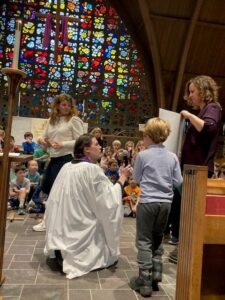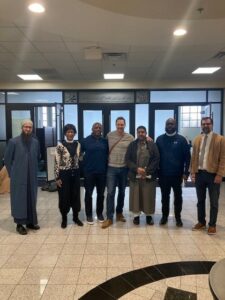Dear Folks,
Last September I began a training program in Spiritual Direction at the Haden Institute in Hendersonville, North Carolina. To be honest, I didn’t quite know what I was getting myself into. As we went around the circle in our first small group session, my cohort members shared compelling stories of relationship stress, career changes, personal loss and growth. “Spiritual direction is a portal to what’s now and what’s next,” said one person. Our mentor added, “This work will strip you naked. It’s hard and it’s good. And the human being you discover is always so beautiful.” My group laughed when I admitted I thought I’d signed up for a long weekend instead of a two-year course— “I wondered how we were going to get all that work done in four days!” But whatever had brought us to each other, I was thankful for the company and the challenges ahead.
Spiritual direction involves deep listening. The “answer” to whatever question one might bring is waiting to be discovered within the directee, by the directee. Because our lives are often chockablock full of distractions or appointments, what one is seeking can be obscured by words and old habits, or by the judgments we carry about the feelings we feel or the thoughts that we think. Deep listening, on the other hand, honors the individual’s soul and trusts its capacity to embrace whatever it finds. It begins with the assumption that the human is precious, that the divine is present with her and within her, and that this Soul is eager to be found.
For thousands of years mystics have discovered and refined practices that develop a relationship to God (or Spirit or Presence) and that deepen this connection within an individual. Spiritual direction, then, is an ancient path for seekers, religious and otherwise, who long to find themselves, or meaning, or purpose by searching for the divine. The practice might include periods of silence, intentional breathing, keeping a journal, walking as prayer, or inviting an image to speak.
The spiritual director acts as a mid-wife—not causing the new birth or even bringing it—but present to the directee’s labor and encouraging it, knowing when to wait and when to push, creating as much safety as possible in an inherently risky situation. Soul work, like being born, moves through the dark. Spiritual direction is to hold space and time for the one who is giving birth and for the one who is being born. The director resists the temptation to control or manage the work that the directee has brought, choosing instead to tend a space of compassion for the directee to do what only she can do.
The curriculum at the Haden Institute is grounded in the work and writing of Karl Jung, and so a significant dimension of spiritual direction is dreamwork. Here’s the frame: each human is made up of the conscious (waking reality), the personal unconscious (memories and experiences that for whatever reason are not available to the conscious mind), and the collective unconscious (the realm of archetypes, images, and the poetic which is older than time and shared by all human beings). Dreams are a gift from the dream maker (God, Spirit, Creation) and they intend our wholeness, seeking to integrate the unconscious with the conscious. Images are the language of dreams, and the individual dreamer is the only one who can know what the images mean for him or her, though dreams can be worked in a group setting. And because the collective unconscious is shared by all human beings, one can be trained to receive another’s dream and invite its images to speak to you, as well.
Would you like to know more about the divine spirit that lives and moves within you? Contact Thomasina Wharton at the Center for Wellbeing or me.
Love,
David


 our meeting, Shaykh Yaseen Shaikh gave several of us a tour, which included popping in on the young students at their Al-Ramah School. One of them led the call to prayer for the community; another chanted from memory a portion of the Qu’ran.
our meeting, Shaykh Yaseen Shaikh gave several of us a tour, which included popping in on the young students at their Al-Ramah School. One of them led the call to prayer for the community; another chanted from memory a portion of the Qu’ran.